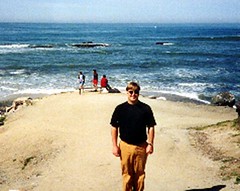I'm starting with a professor I first met in the spring of 1983, with whom I have carried on an off-and-on correspondence for 20+ years and who did more than anyone to jumpstart my burgeoning career as a pop culture writer, even if it took me those same 20+ years to fully take the jump. He also best fits the bill of how I'd answer the title's question with respect to the topic at hand. And hey, without him, I wouldn't have my 20 year old vinyl copy of Abbey Road. But that's a story for later in this column.

John Brewer is a native Liverpudlian and the child of antiques dealers. He attended Cambridge University where he received a rare "starred" first in the History tripos. He proceeded to take a D.Phil. under J. H. Plumb, while also working with Bernard Bailyn as a Henry Fellow on a Visiting Fullbright at Harvard University. His dissertation became his first book, Party Ideology & Politics, published by Cambridge University Press in 1976. Since then he has written or co-written some 11 books on topics as diverse as crime, Britain's naval economy, satirical cartoons, the production of consumer goods in the eighteenth century, and the writing of history. His best known titles include The Birth of a Consumer Society (1982), The Sinews of Power (1989), Consumption and the World of Goods (1994), The Pleasures of the Imagination (1997), and A Sentimental Murder (2004). He has held academic positions at Cambridge, Washington University at St. Louis, Yale, Harvard, UCLA, European University Institute, Chicago, and Caltech, where he is currently Eli and Edye Broad Professor of Humanities and Social Sciences and Professor of History and Literature. From 1987-1991, he was also Director of the Clark Library at UCLA.
Of the books, I'd like to speak briefly about one of the now least well known, the collection of essays on law and rule which Brewer co-edited with John Styles. Of all the volumes coming out of the vibrant cultural exchange between British social history and the Annales School of France in the mid-seventies, An Ungovernable People (1983) had the widest range and the most purely fascinating essays even moreso than Albion's Fatal Tree, even if the latter's impact in the field of history was probably greater. Two personal faves were Keith Wrightson's study of two concepts of order (but then I too became a scholar of the early modern alehouse) and John Style's work on renegade Yorkshire coiners (who knew people filed down 18th century coins because they were made from actual precious metals?!?). These kind of detail specific studies which also generalize to larger theoretical concerns are always my favorite scholarly work. Here I must venture afield to mention my single favorite academic essay of all time, Dick Hebdige's "Object as Image," a heavily theoretical wide-ranging historical reconsideration of the various gender stereotypings of the Italian motorscooter from its birth as mass transit in the immediate post-war aftermath to its transition into a fashion accessory at the height of the mods versus rockers clashes down Brighton way.
I've had to blather on for this length about John's scholarship because it's so central to his identity and to his teaching, in a way that only the best teachers can integrate cutting edge material for undergraduates. Brewer arrived at Harvard from Yale as one of two young, modishly fashionable, and impossibly brilliant Cambridge-trained historians (the other was Simon Schama), the main distinction being John only had one set of colored plastic framed glasses--green if memory serves. I decided to take a look at "The Hanoverian Golden Age 1680-1790" in the spring of 1983 because the previous year's Confidential Guide to Courses at Harvard-Radcliffe 1981-82 had talked it up and Brewer was the chair of my concentration (translation: major), History and Literature. Here's how the Confi Guide introduced Brewer:
Yes, there is hope for you sophisticated scholars. Tired of not being taken seriously just because you're cool? Follow the example of John Brewer: he wears green-rimmed glasses, new-wave neckties, and a gangster hat, cuts his hair to the scalp, and is one of the leading historians in his field.The authors went on to note that Brewer's lectures were highly organized yet still passionate: "He jumps around the stage, from maps to blackboard to slide screen, cursing irresponsible historians, and bellowing out the Truth." Most telling was their conclusion:
More than a lecturer, more than a fashion-plate, John Brewer is a teacher. His interest in students occasionally overflows into demagoguery and bad jokes, but the sentiment is there.That indeed was the John Brewer I came to know well and admire in my remaining two years in Cambridge. That class is also one of those special ones where what you really learned only becomes clear in the long run. I didn't do quite as well as I had hoped (My grade? None of your business and that's not the point of this essay anyway); however, I still regularly refer to and use concepts from E.P. Thompson's classic essays on the "moral economy of the crowd" and "class struggle without class." In fact, the latter informs a recent essay I wrote connecting the Mekons and punk rock to American Alt.Country. In that class John had the publishers rush us pre-publication copies of Roy Porter's mighty little English Society in the 18th Century, invited John Styles over from Bath to lecture on class, and hosted a visit by Graham Swift, who'd just finished but hadn't yet published Waterland. Now that's what I call intellectual juice!
As I was preparing for my fellowship year abroad at York, he arranged to have lunch at one of Cambridge's hidden gems, Iruña. Over spanish omelettes and a pitcher of Sangrìa, he took me through everything I'd need to know to survive life in a British university, suggested some less well known tourist trips worth making, and generally helped me prepare for life abroad by myself (I had lived in Stockholm, Sweden and Freiburg-im-Briesgau, Germany previously but always with my family). As always we also talked about my latest musical finds.
That semester he also taught a new, experimental class, "Britain since 1945." This grand interdisciplinary course featured a listening party of the finest British rock and roll from Tenpole Tudor right the way through to the latest offering from the Smiths, an incredibly diverse reading list, and a fantastic film series with everything from Albert Finney's starring debut in Saturday Night and Sunday Morning through Peter Seller's brilliant dual roles in I'm All Right Jack to Bob Hoskin's modern noir classic The Long, Good Friday and my personal favorite Bill Forsyth's small gem Gregory's Girl featuring Altered Image's oh so fetching frontwoman, Clare Grogan. I wrote a paper based on research I did at the British Library's Music divison during spring break in London on the politics of punk rock with respect to The Sex Pistols, The Clash, and The Jam.
Oh yes, the in-class competition. One day in class Brewer casually mentioned he had a prize for whoever could identify the most faces on the cover of Sgt. Pepper's. Sir Peter Blake's original is in a museum now. A few days later I gave him a nearly complete list. Truth be told, I did consult some reference sources at one point, but they were mainly unreliable as so much rock writing is. One of the evils of the Internet is it makes contests like this almost pointless anymore. The next class somebody asked if the contest was still open and I was so proud to hear Brewer say, "Technically yes, but don't bother because you won't win!" Score! My prize was the purchase of an album of my choice from the Harvard Coop's famous record department, then the finest in New England. I chose Abbey Road which was the one late Beatles album I had somehow missed out on purchasing back in the late 1960s or since then. Yup, that's what I call hip.
Post-Harvard, I have had infrequent meetings with John, usually when we were both in London working at the Reading Room of the British Library. In those days it was still inside the British Museum in what is now the Great Court. We would get togther for lunch (Italian or Greek somewhere in Bloomsbury) or drinks (The Museum Tavern or The Princess Louise on High Holborn) and chat about our projects and whatever was of interest in the papers that week. John kindly put up with my sometimes overly enthusiastic naïveté. But always he asked me "What are you listening to?" as if my taste really mattered. For that and for everything else John, thanks ever so much. And as they say in my beloved Yorkshire "Ta."
In future editions of this column, which like an endless Ray Charles tune will be titled "What is Hip? Part [appropriate number here]," you'll meet amongst others the 2nd grade teacher who first dubbed me G.E. Light, the swim coach who saw me finish 4th in the state of Florida at Junior Olympics while dropping 30 seconds off my previous time in my second competitive try at the 500 yard free as a twelve year old, and the 8th grade English teacher who first showed me Citizen Kane, thus beginning my formal cinematic education.

No comments:
Post a Comment